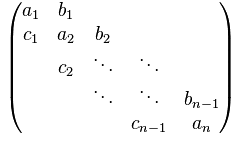 |
TridiagLU
1.0
Scalable, parallel solver for tridiagonal system of equations
|
 |
TridiagLU
1.0
Scalable, parallel solver for tridiagonal system of equations
|
Solve tridiagonal systems of equations in parallel using "gather-and-solve". More...
#include <time.h>#include <sys/time.h>#include <stdlib.h>#include <stdio.h>#include <mpi.h>#include <tridiagLU.h>Go to the source code of this file.
Functions | |
| int | tridiagLUGS (double *a, double *b, double *c, double *x, int n, int ns, void *r, void *m) |
Solve tridiagonal systems of equations in parallel using "gather-and-solve".
Definition in file tridiagLUGS.c.
| int tridiagLUGS | ( | double * | a, |
| double * | b, | ||
| double * | c, | ||
| double * | x, | ||
| int | n, | ||
| int | ns, | ||
| void * | r, | ||
| void * | m | ||
| ) |
Solve tridiagonal (non-periodic) systems of equations using the gather-and-solve approach: This function can solve multiple independent systems with one call. The systems need not share the same left- or right-hand-sides. The "gather-and-solve" approach gathers a tridiagonal system on one processor and solves it using tridiagLU() (sending NULL as the argument for MPI communicator to indicate that a serial solution is desired). Given multiple tridiagonal systems (ns > 1), this function will gather the systems on different processors in an optimal way, and thus each processor will solve some of the systems. After the system(s) is (are) solved, the solution(s) is (are) scattered back to the original processors.
Array layout: The arguments a, b, c, and x are local 1D arrays (containing this processor's part of the subdiagonal, diagonal, superdiagonal, and right-hand-side) of size (n X ns), where n is the local size of the system, and ns is the number of independent systems to solve. The ordering of the elements in these arrays is as follows:
For example, consider the following systems:
\begin{equation} \left[\begin{array}{ccccc} b_0^k & c_0^k & & & \\ a_1^k & b_1^k & c_1^k & & \\ & a_2^k & b_2^k & c_2^k & & \\ & & a_3^k & b_3^k & c_3^k & \\ & & & a_4^k & b_4^k & c_4^k \\ \end{array}\right] \left[\begin{array}{c} x_0^k \\ x_1^k \\ x_2^k \\ x_3^k \\ x_4^k \end{array}\right] = \left[\begin{array}{c} r_0^k \\ r_1^k \\ r_2^k \\ r_3^k \\ r_4^k \end{array}\right]; \ \ k= 1,\cdots,ns \end{equation}
and let \( ns = 3\). Note that in the code, \(x\) and \(r\) are the same array x.
Then, the array b must be a 1D array with the following layout of elements:
[
b_0^0, b_0^1, b_0^2, (diagonal element of the first row in each system)
b_1^0, b_1^1, b_1^2, (diagonal element of the second row in each system)
...,
b_{n-1}^0, b_{n-1}^1, b_{n-1}^2 (diagonal element of the last row in each system)
]
The arrays a, c, and x are stored similarly.
Notes:
| a | Array containing the sub-diagonal elements |
| b | Array containing the diagonal elements |
| c | Array containing the super-diagonal elements |
| x | Right-hand side; will contain the solution on exit |
| n | Local size of the system on this processor |
| ns | Number of systems to solve |
| r | Object of type TridiagLU |
| m | MPI communicator |
Definition at line 64 of file tridiagLUGS.c.